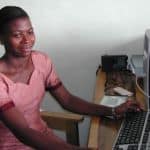The Girl Effect: Accelerator Connects Girls in Poverty with Silicon Valley Innovators
The hour-long bus ride into the Zambian capital Lusaka is one of bumps and endless stops to pick up and drop off passengers, but for the young woman with the long braids who sits in the back seat staring out the window, it’s the perfect time to daydream.
Her name is Annetty Chama and a little more than four months ago she started her first job as a teller at the mobile cash transfer company Zoona. Chama, 19, says she uses her trip in the taxi to dream about being successful and running her own business one day. “You know when you just know you’re going to be successful,” she says. “I’ll be walking to work sometimes and suddenly get excited because I know I’m going to be successful one day.”
Chama wasn’t always so optimistic. She finished school in 2014 but there was no money to further her education. Her only option was to stay at home, helping her grandmother and mother with the cleaning and cooking, caring for her younger siblings and nursing her father and brother, both of them terminally ill.
Then, one morning late in 2016 Chama was offered the chance to take part in a training programme for Zoona. One month later Chama was working in a Zoona kiosk opposite the bus terminus in Lusaka. In a mere six weeks she had gone from unemployed to earning 1,000 Zambian Kwacha ($104) a month and being the main bread-winner for her family.
* * *
The Zoona programme that trained Chama was born out of the Girl Effect Accelerator, an initiative created by the Nike Foundation and the Unreasonable Group. The world’s first accelerator dedicated to adolescent girls chose the 10 companies from around the world that it determined were best positioned to take girls out of poverty, and connected them with some of the best minds in Silicon Valley. Included were Patrick Pachette, former chief financial officer for Google; Seth Godin, best-selling author and marketer; Hannah Jones, Nike Inc.’s vice president, innovation accelerator and chief sustainability officer; and Paul Polak, founder of International Development Enterprises and co-founder and CEO of Windhorse International. They all took part in an intensive two-week boot camp in California in the United States.
Housed in shared tents with outdoor showers, the participants spent two weeks learning from the world-class mentors and each other. The program culminated with each startup presenting to an audience of 600 people at the Palace of Fine Arts in San Francisco.
In a selection process that took 10 months, the startups, spanning 30 countries, were chosen because they were either already providing a clear and direct benefit to girls or positioned to do so. All were for-profit organisations with annual revenue exceeding $500,000 in 2013 and were set up to scale internationally, benefiting girls in multiple countries with the majority of their team living and working in the countries in which they were operating.
The group’s industries were diverse and included Kenya’s Eneza Education, a mobile education application; India’s Jayashree Industries which distributes locally made sanitary pads through women-led franchises; Uganda’s Eco-Fuel Africa; and mobile money startups Paga from Nigeria and Zoona from Zambia.
Mike Quinn, the chief executive of Zoona, says he was astounded by how they were all facing similar business challenges ranging from raising capital to building a team, achieving focus and scaling into new markets. “All startups have to overcome the same hurdles around the world. These challenges – and our perseverance to overcome them – are what connect entrepreneurs together. I learned so much from this group and am proud to call them all friends,” said Quinn.
Zoona, which has revolutionised cash transfers in Zambia by setting up its kiosks for the unbanked in remote parts of the country, was chosen for the Girl Effect Accelerator due to its focus on recruiting high-potential young women from underprivileged communities, between the ages of 18 and 22, to become part of its teller pipeline. It then helps tellers increase and invest their earnings so that they can own their own kiosks, earn more and empower men and women in their communities.
After returning home, Quinn and Lelemba Phiri, Zoona’s chief marketing officer, launched a Girl Effect Accelerator project in Zambia. Most of the women, who were recruited through schools and community and nonprofit organisations, had never used a computer before. The project taught basic computer literacy and provided specific training on how to transact using the Zoona platform and how to become a successful teller. Equipped with a new skills set they were matched with Zoona agents who needed tellers. “The idea is for Zoona agents to employ the recruits as tellers, mentoring them in the business until they are ready to become entrepreneurs themselves,” explained Phiri.
The teller-centric training is ongoing and includes a life skills element. There is a sharp focus on the teller’s individual goals and ambitions, whether or not they align with Zoona’s business, and they are mentored by successful women within the Zoona group who advise and motivate the tellers to create and achieve specific targets in the progression from teller to agent. Promising entrepreneurs are fast-tracked on this journey. The higher earning potential and more flexible working hours of an agent enable the former tellers to pursue the goals and ambitions they brought with them to Zoona.
Zoona, which has already expanded into Malawi and Mozambique, has more than $1 billion in transactions by 1.5 million people on it books. Last year, it raised $15 million in a second round of financing led by the International Finance Corporation, a member of the World Bank Group.
The first-round investors, which include Accion and the Omidyar Network, an impact investment firm started by eBay founder Pierre Omidyar, doubled up on their investments in the second round. Patrick Pichette, one of the Girl Effect Accelerator mentors and a long-time Zoona advisor, also invested in the company. “Zoona is changing the world by building community, entrepreneurs and making financial transactions frictionless and affordable to everyone,” said Pichette.
The second round of money is to help Zoona reach 10 more markets and 30 million consumers across Africa by 2020.
* * *
At 5 p.m. Chama closes the shutter of her kiosk, locks the door and walks across the road to the bus terminus where she drops off the cash with the owner of her Zoona kiosk. A little more than an hour later she is home in Marapodi, side-stepping the puddles on the streets that came after a rain storm earlier that day. “The employment rate is very low so young ladies around here engage in prostitution or loiter on the streets,” she says. “You need money at the end of the day. To get a job is difficult. You need connections.”
Chama will sleep on a sofa in her grandmother’s two-bedroom house and be up at 5 a.m. to start again, but the routine doesn’t bother her. She says she is proud that she is the reason her 12-year-old brother can go to school. She also had a solar panel electricity box installed in her mother using her savings. There is a small amount still to pay and then they will finally have electricity.
Annetty Chama is the Girl Effect Accelerator in action. (Check out the video version of her journey below.)
A version of this post originally appeared on The Media Online and is reprinted here with permission.
Stuart Graham is a multi-format journalist based in Johannesburg, South Africa, and Jennifer Bruce is a photojournalist and videographer based in Cape Town, South Africa.
Photo: Annetty Chama, left, with her mother, Blessing Musonda, at their home in Marapodi Compound in Lusaka, Zambia, last month. By Jennifer Bruce
- Categories
- Education



